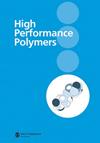Polyimide aerogels with low thermal conductivity and high-temperature stable properties prepared by lyophilization for flexible thermal protection
IF 1.6
4区 化学
Q3 POLYMER SCIENCE
引用次数: 0
Abstract
Polyimide aerogel, presenting an outstanding new material for lightweight protective thermal insulation, has garnered significant attention in the aerospace field. Despite its potential, due to the high production cost of the supercritical drying method used for its preparation, its widespread application is limited. In this research, a series of lightweight polyimide aerogels (F-PIAs, 3,3',4,4'-biphenyl tetracarboxylic dianhydride (s-BPDA) and 4,4'-diaminodiphenyl ether (ODA)) with excellent thermal protection properties were prepared by lyophilization. The findings indicated that F-PIAs (Freeze-dried polyimide aerogels) exhibited comparable physical characteristics to S-PIAs (Supercritical-dried polyimide aerogels), while their preparation cost was even more economical. F-PIAs exhibits excellent flexible and compression behavior (compression strength up to 1.16 MPa, modulus up to 12.8 MPa), which provide a great structural basis for the production of molded thermal insulation protective materials. The average pore diameter of F-PIAs is in the range of 7∼11 nm. The nanoporous structure leads to the gas within the pores of the aerogel producing the Knudsen effect, thereby significantly enhancing the thermal insulation performance of the aerogel. The thermal conductivity of F-PIA-4 (Freeze-dried polyimide aerogels with a solid content of 4%) at room temperature is as low as 0.023 W·m −1 ·K −1 , which is superior to the PIAs (0.043 W·m −1 ·K −1 ) prepared by lyophilization in literature. Its thermal diffusion coefficient changes from 0.108 mm 2 ·s −1 to 0.18 mm 2 ·s −1 in the temperature range of 27°C to 200°C, demonstrating good thermal insulation performance at high temperatures. Meanwhile, after heating on a 150°C flat plate for 11 min and 41 s, the surface temperature of F-PIA-4 was only 36.2°C, further verifying its excellent thermal insulation performance. The results of the TGA experiment on F-PIA-4 demonstrated the high-temperature stability of aerogel (Td5% is higher than 523°C, Td10% is higher than 566°C). The exceptional properties of F-PIAs hold significant practical reference value in helping to reduce the manufacturing cost of high-performance aerogel thermal insulation materials, thereby enabling their widespread application in aerospace, military, and civil field.采用冻干法制备的低导热、高温稳定性能的柔性热防护用聚酰亚胺气凝胶
聚酰亚胺气凝胶作为一种新型的轻质防护隔热材料,在航空航天领域引起了广泛的关注。尽管其潜力巨大,但由于制备所用的超临界干燥方法生产成本高,限制了其广泛应用。本研究通过冻干法制备了一系列具有优良热防护性能的轻质聚酰亚胺气凝胶(F-PIAs, 3,3′,4,4′-联苯四羧酸二酐(s-BPDA)和4,4′-二氨基二苯醚(ODA))。研究结果表明,冻干聚酰亚胺气凝胶(F-PIAs)具有与超临界干燥聚酰亚胺气凝胶(S-PIAs)相当的物理特性,而其制备成本更经济。F-PIAs具有优异的柔韧性和抗压性能(抗压强度可达1.16 MPa,模量可达12.8 MPa),为成型保温防护材料的生产提供了良好的结构基础。F-PIAs的平均孔径在7 ~ 11 nm之间。纳米孔结构导致气凝胶孔隙内的气体产生克努森效应,从而显著提高气凝胶的保温性能。F-PIA-4(冷冻干燥聚酰亚胺气凝胶,固含量为4%)的室温热导率低至0.023 W·m−1·K−1,优于文献中冻干法制备的pia (0.043 W·m−1·K−1)。在27℃~ 200℃温度范围内,其热扩散系数在0.108 mm 2·s−1 ~ 0.18 mm 2·s−1之间变化,具有良好的高温保温性能。同时,在150℃的平板上加热11 min 41 s后,F-PIA-4的表面温度仅为36.2℃,进一步验证了其优异的保温性能。对F-PIA-4的TGA实验结果表明,气凝胶具有高温稳定性(Td5%高于523℃,Td10%高于566℃)。F-PIAs的优异性能对降低高性能气凝胶保温材料的制造成本具有重要的实用参考价值,从而使其在航空航天、军事和民用领域得到广泛应用。
本文章由计算机程序翻译,如有差异,请以英文原文为准。
求助全文
约1分钟内获得全文
求助全文
来源期刊

High Performance Polymers
化学-高分子科学
CiteScore
4.20
自引率
14.30%
发文量
106
审稿时长
1.2 months
期刊介绍:
Health Services Management Research (HSMR) is an authoritative international peer-reviewed journal which publishes theoretically and empirically rigorous research on questions of enduring interest to health-care organizations and systems throughout the world. Examining the real issues confronting health services management, it provides an independent view and cutting edge evidence-based research to guide policy-making and management decision-making. HSMR aims to be a forum serving an international community of academics and researchers on the one hand and healthcare managers, executives, policymakers and clinicians and all health professionals on the other. HSMR wants to make a substantial contribution to both research and managerial practice, with particular emphasis placed on publishing studies which offer actionable findings and on promoting knowledge mobilisation toward theoretical advances. All papers are expected to be of interest and relevance to an international audience. HSMR aims at enhance communication between academics and practitioners concerned with developing, implementing, and analysing health management issues, reforms and innovations primarily in European health systems and in all countries with developed health systems. Papers can report research undertaken in a single country, but they need to locate and explain their findings in an international context, and in international literature.
 求助内容:
求助内容: 应助结果提醒方式:
应助结果提醒方式:


